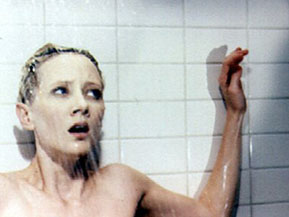|
|
Guilty Pleasures: PsychoBy Samuel HoelkerFebruary 10, 2011
At least Psycho wasn’t remade to appease today’s wayward youth. Director Gus Van Sant, whom you may know as the director whose output is probably the most versatile, both in terms of quality and mainstreamness, has said that his motivation for making it is to prove that a movie can’t be truly remade. I don’t know if this is a point that really needs to be made, but it makes it. Psycho is more than just a generic remake in the vein of The Trouble With Charlie (remember that?); it’s a shot-for-shot remake. Just about every shot is copied from the original, down to the unique cinematography and 1960s clothing (although Julianne Moore’s Lila Crane has a Walkman to show how far we’ve come – and to date this version immediately). Although some things have been updated (the $40,000 Marion steals becomes $400,000), the characters and dialogue remain the same – and it’s occasionally cringe-worthy. Anne Heche’s Marion is flattered when her boss’s client flirts with her, despite her having Viggo Mortensen. She’s still a 1960s secretary. Is this part of what Van Sant was going for? I think it is, yes. Things like that make Psycho not work as a standalone movie. Bernard Hermann’s score is intact (with Danny Elfman doing something to it to put his name in the credits) and it’s used exactly the same way. Yet it doesn’t work. Although it’s an iconic score, it comes across as cheesy and overdramatic. Why is that? Is it because we know that this is a fabrication? Or is it just because it’s in color and it’s made in 1998? I can’t say, but the color doesn’t help. It slows the film down, and it’s not exactly a fast-paced film to begin with.
[ View other Guilty Pleasures columns ]
[ View other columns by Samuel Hoelker ]
[ Email this column ]
|

|
|
|

|
Friday, November 1, 2024
© 2024 Box Office Prophets, a division of One Of Us, Inc.


